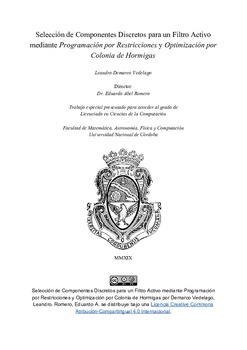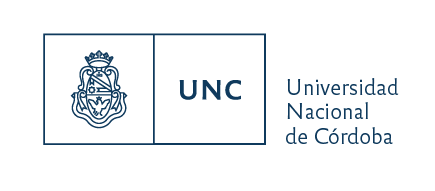| dc.contributor.advisor | Romero, Eduardo Abel, dir. | |
| dc.contributor.author | Demarco Vedelago, Leandro | |
| dc.date.accessioned | 2019-10-29T14:43:08Z | |
| dc.date.available | 2019-10-29T14:43:08Z | |
| dc.date.issued | 2019 | |
| dc.identifier.uri | http://hdl.handle.net/11086/13414 | |
| dc.description | Tesis (Lic. en Ciencias. de la Computación)--Universidad Nacional de Córdoba, Facultad de Matemática, Astronomía, Física y Computación, 2019. | es |
| dc.description.abstract | En el diseño actual de filtros activos una de las opciones de implementación es la denominada RC (resistencia/capacitor), en la cual el filtro se construye a partir de amplificadores operacionales, resistencias y capacitores. Para satisfacer el cumplimiento de las especificaciones del filtro resulta de gran importancia la selección de los componentes discretos del filtro.
Dado el amplio espectro de valores que los componentes pueden tomar, resulta ineficiente enumerar todas las combinaciones posibles y seleccionar entre ellas la mejor. En este trabajo usamos una metaheurística denominada ACOR la cual permite resolver este tipo de problemas combinatorios con restricciones en tiempos de ejecución razonables al tiempo que garantiza que las soluciones obtenidas satisfacen todas las restricciones aunque pueden no ser de la mejor calidad (donde la calidad se define respecto a alguna característica dependiente de los valores elegidos). | es |
| dc.description.abstract | In the current active filter design, one of the possible implementations is the so called RC, in which the filter is built with operational amplifiers, resistors and capacitors. In order to satisfy the filter specifications it’s of great importance the selection of the discrete components that make up the filter.
Given the wide range of values that these components can take, it results inefficient to enumerate all possible combinations and select amongst them the best one. In this work we use a metaheuristic called ACOR which allows to solve this kind of constrained combinatorial optimization problems in reasonable time while guaranteeing that the obtained solutions satisfy all the restrictions, though they might not be of the best quality (where quality is defined with respect to some characteristic that depends on the chosen values). | en |
| dc.language.iso | spa | es |
| dc.rights | Atribución-CompartirIgual 4.0 Internacional | |
| dc.rights.uri | https://creativecommons.org/licenses/by-sa/4.0/deed.es | |
| dc.subject | Teoría de la computación | es |
| dc.subject | Constricción y programación lógica | es |
| dc.subject | Metodologías informáticas | es |
| dc.subject | Construcción de funciones heurísticas | es |
| dc.subject | Diseño y análisis de algoritmos | es |
| dc.subject | Optimización matemática | es |
| dc.subject | Theory of computation | en |
| dc.subject | Constraint and logic programming | en |
| dc.subject | Computing methodologies | en |
| dc.subject | Heuristic function construction | en |
| dc.subject | Theory of computation | en |
| dc.subject | Design and analysis of algorithms | en |
| dc.subject | Mathematical optimization | en |
| dc.subject.other | Metaheurística | es |
| dc.subject.other | Diseño de filtros | es |
| dc.subject.other | Metaheuristics | en |
| dc.subject.other | Filter Design | en |
| dc.title | Selección de componentes discretos para un filtro activo mediante programación por restricciones y optimización por colonia de hormigas | es |
| dc.type | bachelorThesis | es |





